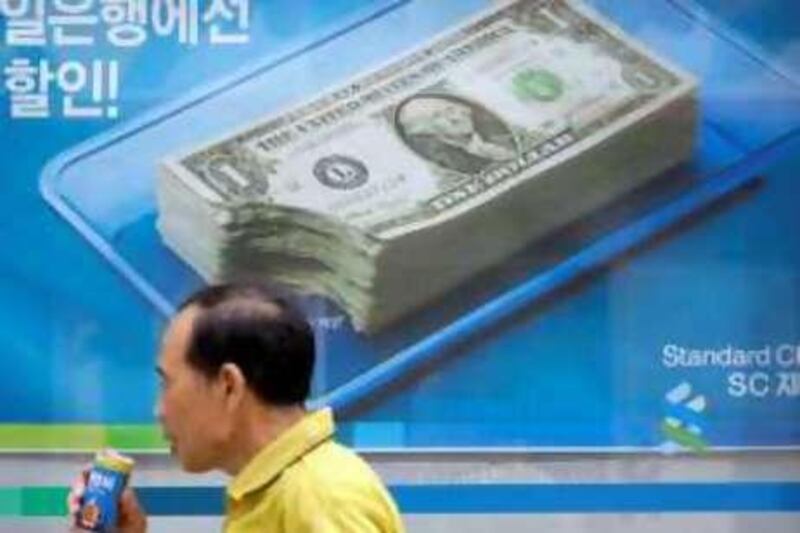SEOUL // South Korea has announced a package worth more than US$130 billion (Dh477.5bn) to rescue its markets hit by the global financial crisis, offering a state guarantee on foreign debt and promising to recapitalise financial firms. Asia's fourth-largest economy has looked one of the region's most vulnerable to the credit crunch, with its banks struggling to find the dollars they need to pay debt and the South Korean won taking a battering from frightened investors.
The country's top three economic planners told a joint news conference that on top of the guarantees worth $100bn, they would also provide $30bn for banks and exporters and help smaller firms get access to a total of 12 trillion won (Dh33bn) in loans. "The government has decided to join in global co-ordinated efforts to stabilise financial markets and we'll continue to provide pre-emptive, decisive and sufficient measures to this end," said the South Korean finance minister Kang Man-soo.
"We believe providing the government guarantee on banks' foreign exchange dealings is the strongest step to save our foreign exchange reserves." The government also said it would announce this week a separate set of measures to help the construction industry, which has been among the hardest hit sectors as the global turmoil reduced economic growth to its slowest in more than a decade. "It seems the government knows what challenges they are facing and how to deal with them," said Hong Sun-young at Samsung Economic Research Institute. "The government has sent a strong signal to market players in a panic that they will stand as lender of last resort in a crisis."
Bond market analysts said the central bank could sharply cut interest rates at its next policy meeting on Nov 7, which would bring its first back-to-back rate cuts since the dotcom bubble burst in 2001. The Bank of Korea cut the benchmark interest rates early this month by a quarter of a percentage point to five per cent, marking the first rate cut in nearly four years and after eight successive increases since late 2005.
The global crisis has dried up dollars available to emerging economies and raised fears about the ability of heavily leveraged South Korean banks to meet their external debts. The won has lost about one third of its value against the dollar so far this year to hit its lowest level since the Asian financial crisis 11 years ago. Foreign investors have sold off a record 30 trillion won of local shares.
The government said it would inject one trillion won of securities held by the government into the Industrial Bank of Korea, which could allow the bank to offer 12 trillion won in fresh loans to customers. Mr Kang said last week that growth in the country's economy of almost $1 trillion would probably fall below four per cent next year from about 4.5 per cent this year. But the ratings agency Moody's Investors Service last week forecast growth next year of 2.2 per cent, which would be the slowest annual growth since 1998.
The government said it was not considering injecting public funds to take stakes in domestic banks for now. However, it could take such steps and offer deposit guarantees if necessary, it added. * Reuters





